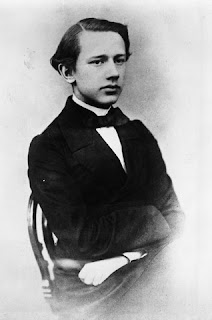When I was growing up, the popular culture referred to
the three “B”s – Bach, Beethoven – and Brahms.
It’s pretty exalted company, but Brahms fits right in. He was born in Hamburg, Germany in 1833; the
son of Johann Jakob Brahms, a musician who gave his son Johannes his first
music lessons. Young Brahms quickly
absorbed everything his father could teach him.
As he entered young manhood, Brahms began to attract notice both as a
pianist and an orchestra and choral conductor.
On tour as an accompanist to a violinist in 1853, he met the famed
violinist Joseph Joachim and the legendary Franz Liszt (Liszt dashed off Brahms’
Scherzo from sight, Brahms fell asleep during Liszt’s piano sonata.)
Brahms continued to compose (he destroyed nearly all
his early work). Joachim had given him a
letter of introduction to Robert Schumann.
Schumann was so overwhelmed by Brahms’ talent that he took him into his
home, and promoted him through his influential Neue Zeitshrift fur Musik.
Brahms began producing masterpiece after masterpiece: four symphonies, two piano concertos, a
violin concerto and a concerto for violin and orchestra, the German Requiem,
among many works for orchestra, chamber ensembles and solo instruments. (Brahms took years to complete his first
symphony, which was finally premiered in 1876.
Hans von Bulow, the famous conductor gave it the nickname “the Tenth” –
supposedly the next installment after Beethoven’s nine symphonies.) Brahms’ reputation was gigantic. Viewed as a traditionalist, his influence was
in opposition to the “new music” of Richard Wagner and Liszt.
Brahms was a lifelong bachelor. After Robert Schumann’s mental collapse and
death; Brahms cared for his widow (the equally talented musician, Clara
Schumann). The exact nature of their
relationship is one of the great mysteries of music, but as one write noted, “their
destruction of their letters to each other may point to something beyond mere
privacy.” In his later years, it was
rumored that Brahms would frequent bawdy houses, where the ladies always asked
the “professor” to sit at the piano and play something. Brahms was also a scholar, editing many works
of the masters, such as Bach. In 1896,
Brahms was diagnosed with cancer and died the following year.
For both of our composers today, it was hard to pick
some representative pieces, but here are two.
First we have the second movement of Brahms’ Piano Concerto No. 2,
played by the legendary Artur Rubinstein.
And for a closer, here’s the fourth movement of Brahms’
Symphony No. 2 in D Major, conducted by the great Wilhelm Furtwangler.
Piotr Ilyich Tchaikovsky was born in Votkinsk, Russia
in 1840. His parents were affluent and
well-versed in the arts and music.
Tchaikovsky began studying the piano at age five and progressed rapidly
in his studies, showing remarkable ability.
His father however wanted him to be a civil servant and the young Tchaikovsky
was sent to civil service school, which he graduated from at the age of
nineteen.
While working in the civil service, Tchaikovsky
continued his musical studies under the tutelage of Anton Rubinstein (one of
the greatest pianists of the age and a noted composer) at the Russian Music
Society (which later became the St. Petersburg Conservatory.) Rubinstein was an internationally renowned
musician and his cosmopolitan style was passed on to Tchaikovsky. Later, this would bring him into opposition
to the “Five”, who promoted a more nationalistic kind of music. It soon became clear that Tchaikovsky was
meant for more than the civil service, and he embarked on a full-time music
career.
Nikolai & Anton Rubinstein
In 1867, Anton Rubinstein’s brother, Nikolai (also a
musician) offered Tchaikovsky the post of Professor of Music at the newly
established Moscow conservatory. For the
next ten years, Tchaikovsky combined his academic duties with music criticism
and composing. His works began to gain
international reputation; in part due the championing of his music by
celebrated musicians such as Hans von Bulow and
Sergei Taneyev, and in part due to the fact that
Tchaikovsky was graced with an almost supernatural ear for long, beautiful,
flowing melodies. He soon became
celebrated as a composer of symphonies, concertos and opera.
Tchaikovsky was almost certainly homosexual; although
he became engaged several times and had a brief, disastrous marriage. He acquired a rich patron, Nadezhda von Meck,
who provided money and advice (the two kept a voluminous and intimate
correspondence over nearly twenty years.)
Her only condition was that they not meet (which suited Tchaikovsky –
although they actually did meet briefly.
Quite by accident, they found themselves at the same event. There was a brief awkward silence and they
quickly parted.)
Tchaikovsky also toured outside Russia (he conducted at
the opening of Carnegie Hall in New York in 1891), yet he seemed unhappy. Shortly after conducting the premiere of his
Symphony No. 6 (Pathetique) in 1893, he died.
The official cause of his death was cholera, brought on by drinking
unsanitary water; although many scholars believe he committed suicide (some
even theorize that his suicide was forced, on account of his homosexuality.)
What is not in dispute, is the incredible legacy of
music he left, and his enormous influence on a generation of Russian composers
(such as Taneyev, Glazunov and Rachmaninoff).
As with Brahms, it’s hard to pick what to share with you, but here are
two that will get your blood pounding.
First, is the concluding movement of Tchaikovsky’s Piano Concerto No. 1,
played by the great Martha Agerich.
And to end our musical birthday, here is the fourth
movement of Tchaikovsky’s Fifth Symphony in E Minor, conducted by the legendary
Leopold Stokowski. Enjoy!
No, it's really Tchaikovsky. The recording just has this ad. I wanted you to hear Stokowski conduct it. Awesome!








No comments:
Post a Comment